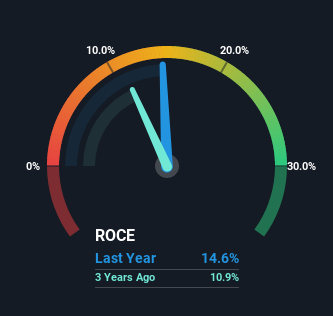- United Kingdom
- /
- Food
- /
- LSE:AEP
Anglo-Eastern Plantations' (LON:AEP) Returns On Capital Are Heading Higher

If you're not sure where to start when looking for the next multi-bagger, there are a few key trends you should keep an eye out for. Firstly, we'd want to identify a growing return on capital employed (ROCE) and then alongside that, an ever-increasing base of capital employed. Ultimately, this demonstrates that it's a business that is reinvesting profits at increasing rates of return. So on that note, Anglo-Eastern Plantations (LON:AEP) looks quite promising in regards to its trends of return on capital.
What is Return On Capital Employed (ROCE)?
Just to clarify if you're unsure, ROCE is a metric for evaluating how much pre-tax income (in percentage terms) a company earns on the capital invested in its business. The formula for this calculation on Anglo-Eastern Plantations is:
Return on Capital Employed = Earnings Before Interest and Tax (EBIT) ÷ (Total Assets - Current Liabilities)
0.15 = US$86m ÷ (US$628m - US$41m) (Based on the trailing twelve months to June 2021).
Thus, Anglo-Eastern Plantations has an ROCE of 15%. On its own, that's a standard return, however it's much better than the 10% generated by the Food industry.
Check out our latest analysis for Anglo-Eastern Plantations

While the past is not representative of the future, it can be helpful to know how a company has performed historically, which is why we have this chart above. If you're interested in investigating Anglo-Eastern Plantations' past further, check out this free graph of past earnings, revenue and cash flow.
What Does the ROCE Trend For Anglo-Eastern Plantations Tell Us?
The trends we've noticed at Anglo-Eastern Plantations are quite reassuring. The data shows that returns on capital have increased substantially over the last five years to 15%. The company is effectively making more money per dollar of capital used, and it's worth noting that the amount of capital has increased too, by 27%. This can indicate that there's plenty of opportunities to invest capital internally and at ever higher rates, a combination that's common among multi-baggers.
The Bottom Line
A company that is growing its returns on capital and can consistently reinvest in itself is a highly sought after trait, and that's what Anglo-Eastern Plantations has. Since the stock has only returned 23% to shareholders over the last five years, the promising fundamentals may not be recognized yet by investors. So exploring more about this stock could uncover a good opportunity, if the valuation and other metrics stack up.
One more thing, we've spotted 1 warning sign facing Anglo-Eastern Plantations that you might find interesting.
While Anglo-Eastern Plantations may not currently earn the highest returns, we've compiled a list of companies that currently earn more than 25% return on equity. Check out this free list here.
New: Manage All Your Stock Portfolios in One Place
We've created the ultimate portfolio companion for stock investors, and it's free.
• Connect an unlimited number of Portfolios and see your total in one currency
• Be alerted to new Warning Signs or Risks via email or mobile
• Track the Fair Value of your stocks
Have feedback on this article? Concerned about the content? Get in touch with us directly. Alternatively, email editorial-team (at) simplywallst.com.
This article by Simply Wall St is general in nature. We provide commentary based on historical data and analyst forecasts only using an unbiased methodology and our articles are not intended to be financial advice. It does not constitute a recommendation to buy or sell any stock, and does not take account of your objectives, or your financial situation. We aim to bring you long-term focused analysis driven by fundamental data. Note that our analysis may not factor in the latest price-sensitive company announcements or qualitative material. Simply Wall St has no position in any stocks mentioned.
About LSE:AEP
Anglo-Eastern Plantations
Owns, operates, and develops agriculture plantations in Indonesia and Malaysia.
Flawless balance sheet, good value and pays a dividend.
Similar Companies
Market Insights
Community Narratives




